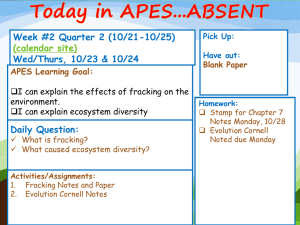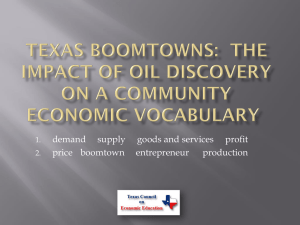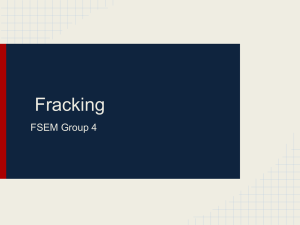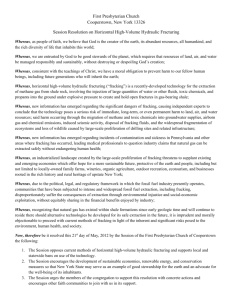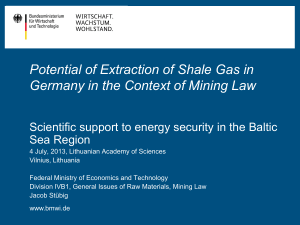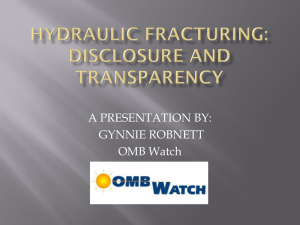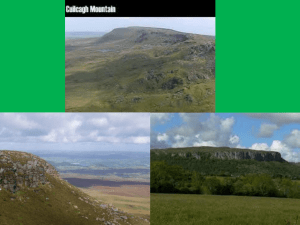ConocoPhilips-Letter-General-Public
advertisement
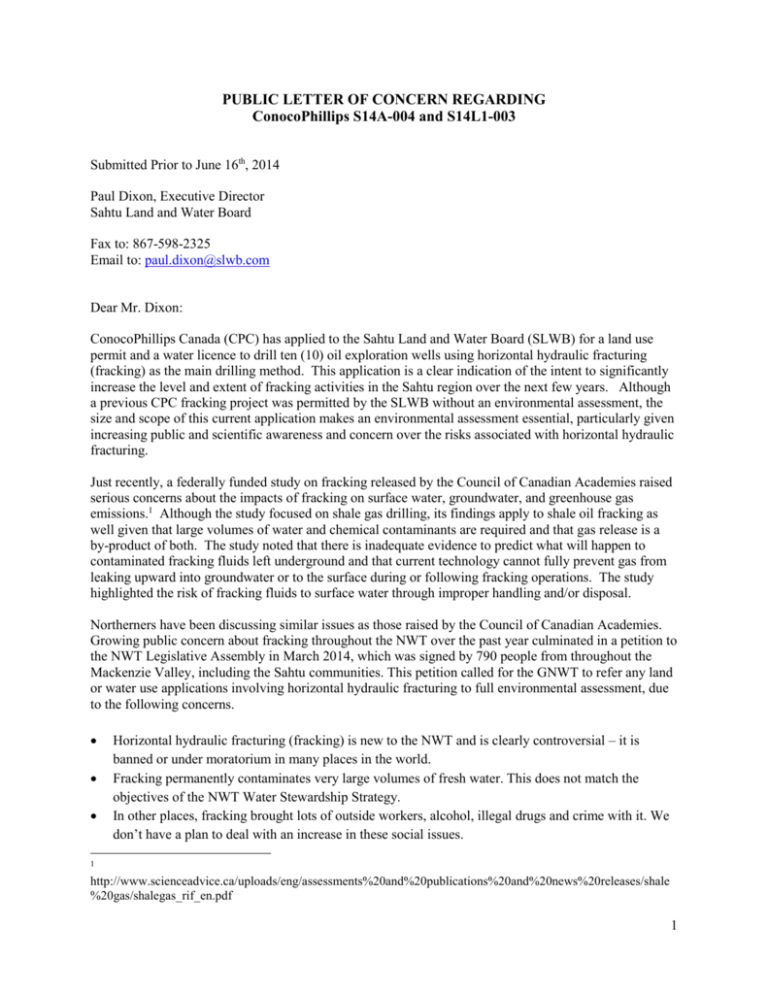
PUBLIC LETTER OF CONCERN REGARDING ConocoPhillips S14A-004 and S14L1-003 Submitted Prior to June 16th, 2014 Paul Dixon, Executive Director Sahtu Land and Water Board Fax to: 867-598-2325 Email to: paul.dixon@slwb.com Dear Mr. Dixon: ConocoPhillips Canada (CPC) has applied to the Sahtu Land and Water Board (SLWB) for a land use permit and a water licence to drill ten (10) oil exploration wells using horizontal hydraulic fracturing (fracking) as the main drilling method. This application is a clear indication of the intent to significantly increase the level and extent of fracking activities in the Sahtu region over the next few years. Although a previous CPC fracking project was permitted by the SLWB without an environmental assessment, the size and scope of this current application makes an environmental assessment essential, particularly given increasing public and scientific awareness and concern over the risks associated with horizontal hydraulic fracturing. Just recently, a federally funded study on fracking released by the Council of Canadian Academies raised serious concerns about the impacts of fracking on surface water, groundwater, and greenhouse gas emissions.1 Although the study focused on shale gas drilling, its findings apply to shale oil fracking as well given that large volumes of water and chemical contaminants are required and that gas release is a by-product of both. The study noted that there is inadequate evidence to predict what will happen to contaminated fracking fluids left underground and that current technology cannot fully prevent gas from leaking upward into groundwater or to the surface during or following fracking operations. The study highlighted the risk of fracking fluids to surface water through improper handling and/or disposal. Northerners have been discussing similar issues as those raised by the Council of Canadian Academies. Growing public concern about fracking throughout the NWT over the past year culminated in a petition to the NWT Legislative Assembly in March 2014, which was signed by 790 people from throughout the Mackenzie Valley, including the Sahtu communities. This petition called for the GNWT to refer any land or water use applications involving horizontal hydraulic fracturing to full environmental assessment, due to the following concerns. Horizontal hydraulic fracturing (fracking) is new to the NWT and is clearly controversial – it is banned or under moratorium in many places in the world. Fracking permanently contaminates very large volumes of fresh water. This does not match the objectives of the NWT Water Stewardship Strategy. In other places, fracking brought lots of outside workers, alcohol, illegal drugs and crime with it. We don’t have a plan to deal with an increase in these social issues. 1 http://www.scienceadvice.ca/uploads/eng/assessments%20and%20publications%20and%20news%20releases/shale %20gas/shalegas_rif_en.pdf 1 Fracking will require transporting toxic fracking chemicals and polluted waste water through our communities, along our highways and on the Mackenzie River. NWT workers will also be exposed to these hazardous substances. Sahtú elders tell us that water flows through the deep geology of the Sahtú and that different areas are connected in ways that science has not documented. We also know that underground networks of fractured rock and wells will eventually leak. We have to look at the bigger picture. Our land, water, wildlife, cultures, communities and economies are already under stress and will suffer from the additional stress of fracking and associated development without proper assessment and planning. Extracting oil and gas increases greenhouse gas emissions and makes global climate change happen faster. Greenhouse gas emissions come both directly from the fracking operation and from burning the oil and gas that is extracted. The decision to allow fracking in the NWT without an environmental assessment has created severe social tension in the Sahtu and across the NWT. The CPC application raises particular concerns: CPC is proposing to increase the volume of water required for each well (from its previous permit) and expects to draw this water from nearby lakes. This water will be permanently contaminated with chemicals and is therefore lost as a freshwater resource. CPC is proposing a significant increase in the number of fracking stages per well, which will means that more toxic fracking chemicals are required, raising issues about shipping, handling, disposal, and long term underground monitoring of these contaminants. More fracking stages increases the risk of destabilizing underground geological formations and opening up pathways for the leakage of gas and contaminated water to groundwater and to the surface. In the traditional knowledge (TK) study documents submitted with the application, it is noted that elders and harvesters know very little about the proposed fracking operations. How can they properly assess impacts on their traditional values and inherent rights without a full disclosure and discussion of the nature and extent of fracking operations proposed in the region? CPC may assume that its previous permit gives it the social licence to expand this activity, but recent and growing opposition to fracking as indicated in the NWT petition and petitions from citizens in Tulita and other Sahtu communities clearly show that this company does not have a social licence to proceed. The documents submitted with the CPC application are enormous: almost 200 megabytes of data and information, much of which cannot be easily downloaded and certainly cannot be printed or reviewed by ordinary citizens. In fact, it is completely unreasonable to expect that the public or the agencies representing public interests can review these documents in detail and conclude by June 16th whether this proposed project will or will not have significant impacts on the environment. This is especially true given the Council of Canadian Academies report that very little is known or can be assumed about the impacts of fracking operations on surface water, groundwater, and gas emissions. Finally, the Government of the NWT, which is the body now responsible for regulating oil and gas activities, including horizontal hydraulic fracturing, has only just begun the process of establishing regulations for this form of exploration and development technology. In effect, our NWT regulatory framework is currently inadequate to properly manage fracking operations. 2 For all of these reasons, the undersigned strongly demand that the Sahtu Land and Water Board refer ConocoPhillips’ application to an environmental assessment with full public hearings. An environmental assessment is currently the only means by which the public and public agencies can properly review the ConocoPhillips application and determine the impacts of this project on the people and environment of the NWT. Yours truly, Signature Community Contact (phone or email) 3
